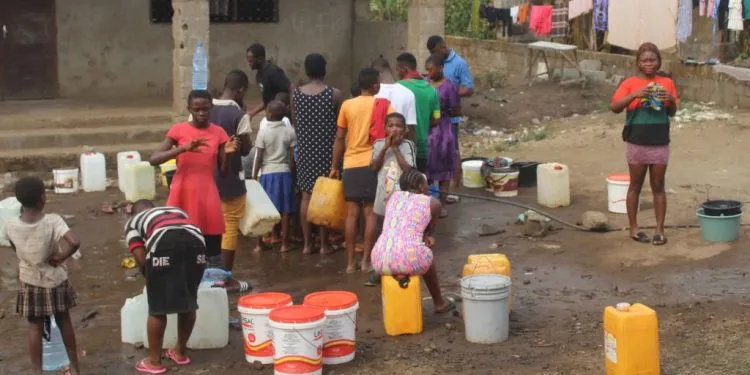By Tata Mbunwe
The increasing scarcity of potable water has left the population of Buea, Southwest region, with no other option than to fully embrace boreholes, also called forage, as a way out.
But this new norm only benefits the rich who have what it takes to drill one. The poor are left to struggle on a daily basis, queuing around water catchments or public taps that rarely run at all.
The issue of water scarcity bugging Buea surprises many who know of the town’s water-rich potentials.
Located at the foot of a volcanic mountain, Mount Fako, Buea has several potential sources of clean water, usually oozing freely from its rich mountainous rocks. Yet, potable water is by far insufficient for the city’s growing population.
“This town is blessed with abundant water resources but paradoxically the inhabitants of this region are facing a serious water crisis as there is insufficient water to simultaneously support both human and ecosystem needs,” wrote Buea-based environmental non-governmental organization, ERuDeF on its website, amid the water crisis.
Taps are consistently running dry in most households and drinking water becoming scarcer as the days go by.
Toilets are going dirty because there is no water to flush them and children are going late to school because they must cue for hours at public water points in the morning. Keeping simple hygiene at home is becoming more difficult because the universal solvent, water, is unavailable.
Desperate for water, Buea’s population has resolved to drilling boreholes, but this option is only pursued by the rich because a single bore hole project costs not less than FCFA 1.5 million to realize.
This is just too costly for an average household in Buea, especially given the economic pressure the four-year-long Anglophone crisis has put on most English-speaking parents.
Thousands of internally displaced persons, who barely have basic means of survival, are also taking shelter in the town, and many of them cannot afford three meals a day, talk less of spending over a million francs on a water project.
With very little hopes on the regular potable water from State Water Company, CAMWATER, the vulnerable population only relies on the generosity of rich borehole owners.
Most wealthy house owners and landlords of residential buildings and hostels in the city have given up on CAMWATER.
Boreholes are now being drilled in Buea nearly on a daily basis. The drilling process is a difficult and expensive one and may take up to a week, depending on the environment where it is being done.
Despite the proliferation of these boreholes, not everyone gets to benefit from them. Mostly the rich do, and the poor are left to hustle and bustle around with empty water containers.
In some neighbourhoods like Sandpit, where potable water rarely runs, generous borehole owners sometimes open up their taps to the public.
But some of these rich neighbours are not lavish, sometimes because of the cost in drilling a borehole and the stakes that come with managing it – boreholes need constant electricity to function.
In some cases, the borehole owners sell the water to the public at FCFA 50 per 20 litres of water.
Gov’t’s efforts leave insignificant change
Both State and municipal authorities in the town of Buea say they have been concerned about the water scarcity situation, but efforts to assuage the situation have not led to any significant change.
The Mayor of the Buea Council, which is the city’s local administration, claimed in one of their Council sessions last year, that they drilled some boreholes in water some starved neighborhoods in the town, but from all indications, much still needs to be done.
Also, the Southwest Regional Assembly, a decentralized arm of government in charge of regional administration and development, has also been concerned about the water situation in the town and in the region as a whole.
The Regional Council President, Zacheus Bakoma Elango, told journalists during its December 2021 budgetary session that the administrative body was intensifying efforts to boost water supply to in Buea and other parts of the Southwest region.
The regional body adopted FCFA 3.2 billion as 2022 budget and they said they will also be tackling water supply in parts of the region, including Buea.
“The issue of availability of water supply is not only common to Buea but to many localities. That is why we are constructing a series of manual boreholes across the regions,” Bakoma Elango told journalists in December.
Just like the rest of the population, the regional body also aims at drilling more boreholes to increase on water supply. It promised that, before this year runs out, it will construct an electrical borehole at the Buea School for the Blind.
“We shall embark on projects to supply water to some localities like Bojongo (Buea Subdivision), Mbongo Bonjare in Bamusso Subdivision, as well as a series of manual boreholes across the region,” Bakoma added.
NGOs stepping in to help
Some non-governmental organisations are also intervening to assuage the situation. The Environmental and Rural Development Foundation, ERuDeF, says it is planning to drill 30 boreholes to serve the thousands of inhabitants who cannot afford to own one.
“The local population is exposed to diseases such as cholera, typhoid, diarrhea, and other water-borne illnesses which are all associated to water scarcity. If strict measures are not taken to fight against this crisis, the local population is going to face other problems such as hunger and desertification, which are worse than the ones listed above,” EruDef wrote on its website.
As boreholes become a new norm in Buea, there may also be concerns about the safety of drinking water gotten from this source, given that these boreholes are not controlled by any water authority that checks its safety.



